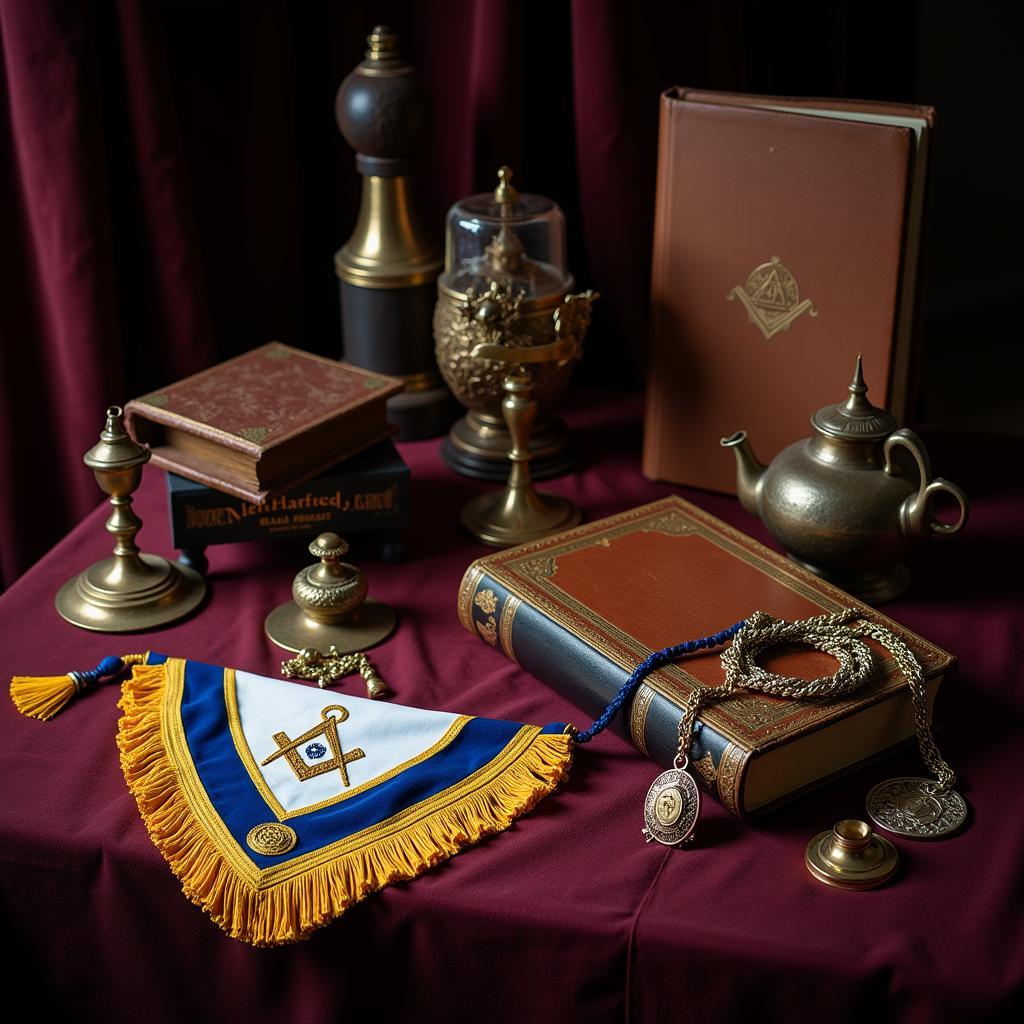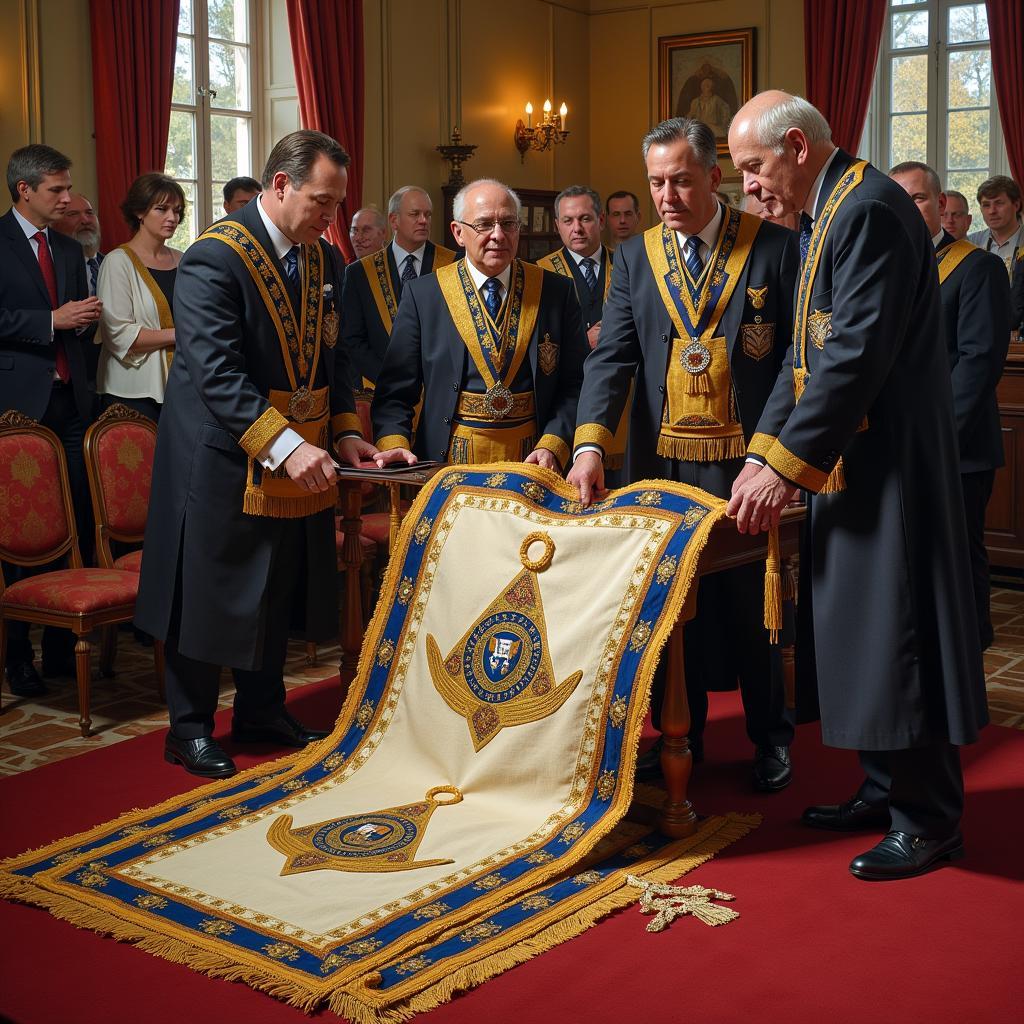When a loved one who was a Freemason passes away, families are often left wondering what to do with their Masonic belongings. These items, imbued with symbolism and personal significance, deserve respectful handling. This guide provides insights into the proper etiquette and options for dealing with Masonic items after death.
Understanding the Significance of Masonic Items
Masonic items are more than just trinkets; they represent a brother’s dedication to the fraternity’s values of brotherhood, charity, and truth. From aprons and jewels to rituals books and certificates, each object holds meaning within the Masonic tradition.
 Handling Masonic items after death
Handling Masonic items after death
Consulting the Will and Family Wishes
The first step is to consult the deceased’s will. Often, Masons specify their wishes regarding their Masonic belongings. They may bequeath specific items to family members, friends, or their lodge. If the will doesn’t offer clear instructions, open communication with family members is crucial to understand their preferences and ensure everyone feels respected.
Options for Masonic Items
There are several respectful options for handling Masonic items:
- Returning to the Lodge: Most Masonic lodges welcome the return of a deceased member’s belongings. Items like aprons, jewels, and rituals books can be used for lodge ceremonies, displayed in memory of the departed brother, or archived for historical preservation.
- Keeping within the Family: If the deceased had a strong connection with certain items, family members might choose to keep them as cherished keepsakes. This is particularly common with items like Masonic rings, pocket watches, or photographs.
- Donating to Masonic Museums or Libraries: Several Masonic institutions preserve and exhibit artifacts related to Freemasonry. Donating items allows for their historical and cultural value to be shared with a wider audience.
Items with Specific Protocols
Certain Masonic items may have specific protocols for disposal:
Masonic Aprons:
The Masonic apron, a symbol of purity and Masonic work, often holds deep personal meaning. Some lodges have ceremonies for respectfully disposing of or preserving a deceased brother’s apron.
 Masonic ceremony for an apron
Masonic ceremony for an apron
Masonic Rings and Jewels:
These items, often engraved with symbols and lodge affiliations, can be kept by family, offered to the lodge, or donated to a Masonic museum.
Masonic Certificates and Documents:
Certificates of membership, degrees attained, and other documents can be valuable historical records. Consider offering them to the lodge or a Masonic archive for preservation.
Respectful Disposal
If an item cannot be kept, donated, or returned to the lodge, it’s essential to dispose of it respectfully. Avoid simply discarding Masonic items in the trash. Consult with the lodge or a knowledgeable Mason for guidance on appropriate disposal methods.
Seeking Guidance
Navigating the proper handling of Masonic items can feel overwhelming. Remember that you are not alone. Reach out to the deceased’s lodge, a trusted family friend who is a Mason, or a Masonic organization for support and guidance. They can offer advice, explain local customs, and help ensure that your loved one’s Masonic legacy is honored appropriately.
Frequently Asked Questions
Q: What should I do with a Masonic Bible?
A: Masonic Bibles are often family heirlooms. Consider keeping it within the family or offering it to a family member who might appreciate its significance.
Q: Can I sell my loved one’s Masonic items?
A: While it’s legally permissible, selling Masonic items is generally discouraged out of respect for the fraternity and its principles.
Q: What if I can’t find a lodge affiliated with my loved one?
A: Contact the Grand Lodge of the state where your loved one resided. They can help you locate the correct lodge or provide guidance.
Q: Can I donate Masonic items to a non-Masonic charity?
A: It’s best to consult with the lodge first, as they might have specific preferences or suggestions for donation.
Need Further Assistance?
We understand that navigating these decisions can be difficult. If you have any questions or require further guidance, please do not hesitate to reach out to us. Contact our dedicated team at Số Điện Thoại: 0909802228, Email: doibongda@gmail.com or visit us at 101 Đ. Lý Chiêu Hoàng, Phường 10, Quận 6, Hồ Chí Minh, Việt Nam. We are available 24/7 to provide support and address your concerns.